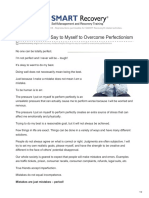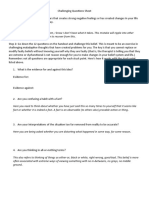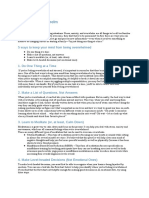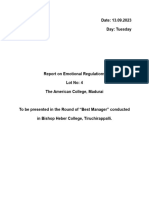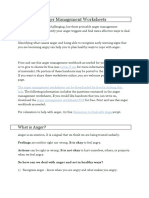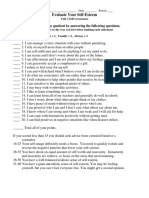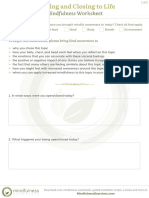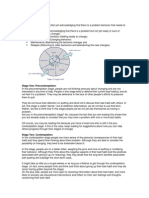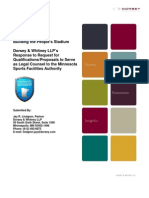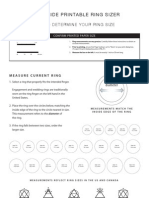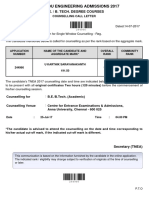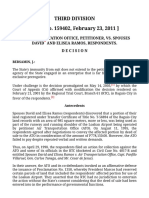The Stages of Change
A motivational tool and an aid to develop a plan for recovery
Termination Pre-Contemplation
I’ve changed for the better. I don’t have a problem,
My new life is better. why should I change?
Relapse
I have forgotten why
I needed to change
Maintenance Contemplation
I’m glad that I changed. Maybe I do have a problem,
I’m sticking to my plan. but how can I change?
Action Preparation
I am following a plan. I’m ready to change.
I am changing! I’m going to change!
Change isn’t always constant. Your motivation may rise or fall. It may seem to be progressing
quickly, or be frustratingly slow. Change will happen, for good or ill. Just remember, you are in
control of that change.
Changing behavior can be difficult. Research shows that people normally find it difficult to
change long-standing habitual behaviors, including addictions, unhealthful diet, and lack of
regular exercise. This appears as true for addictions as for medical problems (i.e. asthma,
diabetes, and hypertension) which also require choice and a commitment to make healthy
lifestyle changes.
� The Stages of Change as a SMART Recovery® Tool
An exercise to aid the development of motivation
Understanding the Stages of Change model can help you focus on the tasks that will aid you the most at
this point in your recovery and will help you find the proper tools, activities, and information that will
aid your recovery.
The Stages of Change:
1. PRE-CONTEMPLATION: At this stage, you might not be aware that there is a problem that needs
your attention or you might not consider that changing your behavior is worth the bother. You
may be demoralized, uninterested, or unwilling to change. You may be attending a meeting
because of some coercion. For you, just sitting in on a meeting and listening to others may be
helpful, and you may find that change is not as difficult as you believe and can actually be very
rewarding.
2. CONTEMPLATION: At this stage, you’ve become aware that some kind of change may be
necessary in order to regain some control of your life. You might be weighing the pros and cons of
changing but lack the confidence to know if you are making the right decision. Still, you are giving
the possibility of changing some thought. Writing out the pros and cons in a Cost Benefit Analysis
and reviewing it regularly can aid the decision making process and help you make some positive
changes.
3. PREPARATION: At this stage, although you may still feel somewhat ambivalent or anxious, you
have concluded that the negatives of your behavior outweigh the positives, and you have
accepted responsibility for changing your behavior. You now feel ready to make decisions and
plans and strengthen your commitment to change. Completing a Change Plan Worksheet and
researching recovery options can be helpful.
4. ACTION: During this stage, you might choose to work on your own or with the help and support of
groups (such as SMART Recovery®). Some people may feel the need for the controlled environment
of inpatient, or residential treatment. You could also choose to use counselors or other sources of
professional guidance. At this time, you will be learning new ways of handling old situations, such
as social pressures, temptations, making excuses, and other situations that could harm your
motivation to change. By learning ways to deal with urges, cravings and uncomfortable or
destructive emotions, you will work toward finding a way to live your life without the need for
alcohol, drugs, or other destructive habits. The recovery tools you use will reflect your unique
situation and life experiences.
5. MAINTENANCE: This stage reflects the knowledge and skills you have learned that have resulted
in a positive change in your behavior. In the three to six months since you began your recovery,
you are enjoying the fruits of your efforts and are developing a social support system and securing
the strategies needed to maintain your successes. You do, however, stay vigilant for high-risk
situations and remain focused on relapse prevention.
6. TERMINATION: At some point, you may consider yourself recovered. You have adopted a new self-
image consistent with your new desired behaviors and lifestyle. You express confidence and enjoy
self-control. You no longer react to any temptation in any situation. New behaviors have replaced
the old, and the old habits no longer have a place in your life. You now can appreciate your
healthier and happier life. Hence, in SMART Recovery®, you may graduate.
RELAPSE: Not a stage but an event, a “slip”, “lapse”, or “relapse” is the result of personal distress or
social pressures that lead to an interruption of the behavior change process. These events could occur at
any time, but they are not inevitable. This experience should not be used as an excuse to enter into a
period of prolonged or excessive using or be the cause for crushing self-reproach and guilt. It’s better to
accept these events as a normal part of the recovery process than to call your attempt to change a
failure and give up. Handled well, these occurrences can be brief, not overly dangerous, and serve as a
learning experience. These events, though very troubling, can serve as an education to prevent future
occurrences.
Based on: Prochaska, J.O., DiClemente, C.C., and Norcross, J.C. “Changing for Good”. NY: Avon, 1994.
Adapted by Henry Stienberger, Ph.D.
















